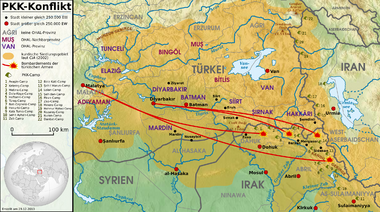Kurdish–Turkish conflict (1978–present) facts for kids
Quick facts for kids PKK–Turkish conflict (1978–present) |
|||||||
|---|---|---|---|---|---|---|---|
| Part of the Kurdish–Turkish conflict | |||||||
 Overview of the Kurdish – Turkish conflict (2010) |
|||||||
|
|||||||
| Belligerents | |||||||
Other forces:
Supported by:
|
|
||||||
| Strength | |||||||
| Turkish Armed Forces: 639,551: Gendarmerie: 148,700 Police: 225,000 Village Guards: 65,000 (not all directly involved in the conflict) |
PKK: 4,000–32,800 PJAK: 1,000–3,000 TAK: A few dozen Total: ≈5,000–32,800 |
||||||
| Casualties and losses | |||||||
| Before 2015: 5,347 soldiers, 283 police officers and 1,466 village guards killed, 95 captured (24 currently held) 2015–present: 1,166 killed Total: 8,266 killed and 21,128 wounded |
Total: 43,019–47,074 killed and 22,703+ captured |
||||||
|
Total killed: 55,000–60,000 Civilian casualties: 6,741 killed and 14,257 wounded by the PKK until 2015 (Turkish government claim) 2,400–4,000+ villages destroyed by the Turkish government |
|||||||
The Kurdish–Turkish conflict is an armed conflict between the Republic of Turkey and various Kurdish insurgent groups who have either demanded separation from Turkey to create an independent Kurdistan, or attempted to secure autonomy and greater political and cultural rights for Kurds inside the Republic of Turkey.
The main rebel group is the Kurdistan Workers' Party (PKK) (Kurdish: Partiya Karkerên Kurdistanê). Although the Kurdish-Turkish conflict has spread to many regions, most of the conflict has taken place in Northern Kurdistan, which corresponds with southeastern Turkey. The PKK's presence in Iraqi Kurdistan has resulted in the Turkish Armed Forces carrying out frequent ground incursions and air and artillery strikes in the region, and its influence in Syrian Kurdistan has led to similar activity there. The conflict has cost the economy of Turkey an estimated $300 to 450 billion, mostly in military costs. It has also affected tourism in Turkey.
A revolutionary group, the PKK was founded in 1978 in the village of Fis, Lice by a group of Kurdish students led by Abdullah Öcalan. The initial reason given by the PKK for this was the oppression of Kurds in Turkey. At the time, the use of Kurdish language, dress, folklore, and names were banned in Kurdish-inhabited areas. In an attempt to deny their existence, the Turkish government categorized Kurds as "Mountain Turks" during the 1930s and 1940s. The words "Kurds", "Kurdistan", or "Kurdish" were officially banned by the Turkish government. Following the military coup of 1980, the Kurdish language was officially prohibited in public and private life until 1991. Many who spoke, published, or sang in Kurdish were arrested and imprisoned.
The PKK was formed in an effort to establish linguistic, cultural, and political rights for Turkey's Kurdish minority. However, the full-scale insurgency did not begin until 15 August 1984, when the PKK announced a Kurdish uprising. Since the conflict began, more than 40,000 have died, the vast majority of whom were Kurdish civilians. Both sides were accused of numerous human rights abuses during the conflict.
In February 1999, PKK leader Abdullah Öcalan was arrested in Nairobi, Kenya by a group of special forces personnel and taken to Turkey, where he remains in prison on an island in the Sea of Marmara. The first insurgency lasted until March 1993, when the PKK declared an unilateral ceasefire. Fighting resumed the same year. In 2013, the Turkish government started talks with Öcalan. Following mainly secret negotiations, a largely successful ceasefire was put in place by both the Turkish state and the PKK. On 21 March 2013, Öcalan announced the "end of armed struggle" and a ceasefire with peace talks.
On 25 July 2015, the conflict resumed when the Turkish Air Force bombed PKK positions in Iraq, in the midst of tensions arising from Turkish involvement in the Rojava–Islamist conflict in Syria. Substantial parts of many Kurdish-majority cities including Diyarbakır, Şırnak, Mardin, Cizre, Nusaybin, and Yüksekova were destroyed in the clashes.
See also
 In Spanish: Conflicto turco-kurdo (1978-presente) para niños
In Spanish: Conflicto turco-kurdo (1978-presente) para niños
- Iraqi–Kurdish conflict
- Iranian–Kurdish conflict
- Syrian-Kurdish conflict
- Iraq–Turkey border
- List of Turkish Armed Forces operations in Northern Iraq
- Maoist insurgency in Turkey
- Turkish involvement in the Syrian Civil War

